 Big advances in automotive technology have led to the development of high-tech fluids to keep pace. A simple example of this is the cooling system. For decades it was primarily made out of iron, steel and rubber hoses. There was one kind of coolant that protected these components from corrosion.
Big advances in automotive technology have led to the development of high-tech fluids to keep pace. A simple example of this is the cooling system. For decades it was primarily made out of iron, steel and rubber hoses. There was one kind of coolant that protected these components from corrosion.
Now cooling system components are made with various metal alloys and plastics. These materials require different additives to protect them from corrosion. Since the materials used vary from manufacturer to manufacturer, we now have a number of different kinds of coolant at Express Car Care in Denver. And it’s important to use the right coolant for your vehicle. If you pour in the wrong kind, it wont’ protect the cooling system and may even void the warranty. Your helpful Express Car Care adviser will know the proper coolant to use. If you’re concerned you may have used the wrong one, be safe and have your Express Car Care technician flush the system and start fresh with the correct fluid.
Brake fluid is confusing for some people. For a very long time, most vehicles used Dot 3 brake fluid. Now we have Dot 4 & 5. Some people mistakenly think the higher numbers are an upgrade. You know, if 3 is good then 4 must be better. That’s not how it works. They have different formulations to meet the requirements of differences in brake systems. Only one of them is recommended for your vehicle.
Transmission fluid is the same thing. With the tremendous engineering advances in automatic transmissions, there have been several new types of fluids developed to protect and lubricate them. Nowhere are the advances in automotive fluids more evident than in motor oil. Many new weights and formulations have been created to meet the demands of today’s modern engine design.
Modern engines have more parts and much tighter tolerances. Every year, engines make more power and get better fuel economy. And even with all the complexities and sophistication, they still have to be durable. That’s where the new grades of engine oil come in. They have to be formulated to lubricate, protect and clean all of those engine parts, big and small. The oil has to be thin enough to get into small passages, yet resistant to vaporization.
Your vehicle may have come from the factory with synthetic oil and/or transmission, brake, differential fluid, etc. If so, your recommended service intervals will be based on synthetic-type fluids and you should use the same type when your vehicle is serviced at Express Car Care.
Because grades of oil and types of coolant, transmission fluid, brake fluid, etc. are so carefully matched to the vehicle, take care to always use the proper fluid if you are topping off at home. Check your vehicle owners manual or ask your Express Car Care service adviser. The wrong fluid can cause damage.









